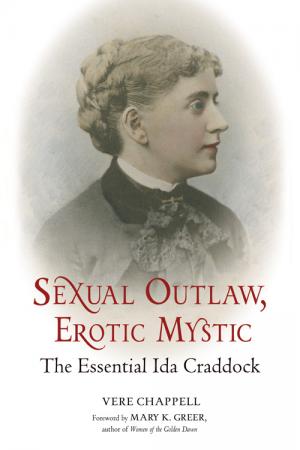Sexual Outlaw, Erotic Mystic: The Essential Ida Craddock

One of the best things about reviewing books is the exposure I get to the fabulous females in feminist history who would otherwise be consigned to the cobwebby corners of academic obscurity had some enterprising writer not plucked them from the depths and held them up for the delight of feminist history nerds. This was what I experienced with Sexual Outlaw, Erotic Mystic, which is part biography and part collected works of Ida Craddock. The editor and biographer intersperses five (long) chapters of Craddock's own writings with well-written biographical detail explaining Craddock's often puzzling rhetoric.
Ida C. Craddock was a writer and teacher and at the age of twenty-five, she challenged the status quo by being the first woman to apply for admission to the University of Pennsylvania. She passed the entrance exam and was recommended for admission, but the board of trustees quickly passed a resolution barring women from attending the school. Her career as a teacher would be limited as a result of this setback. She spent the next several years traveling, teaching stenography, and studying spirituality, until 1893 when the Chicago World's Fair opened. The belly dancers imported from the Middle East scandalized America—and Anthony Comstock in particular. Comstock was a powerful proponent of “blue laws” (laws created to enforce strict moral and religious standards of behavior) and the self-appointed postal inspector. Craddock took advantage of the scandal by writing an editorial in the New York World defending the dancers and poking gentle fun at Comstock. It's what she said at the end of the piece; however, that caught the attention of the world: Craddock claimed she had a “spirit husband” named Soph, with whom she had sex nightly.
Craddock’s editorial and claims of spirit-world sexual relations aside, she made a powerful enemy of Comstock by publishing and distributing “sex manuals.” Craddock, though an ardent freethinker, was not a proponent of sex outside of marriage and her sex manuals were intended for married couples only, but this was not good enough for Comstock (or Ida's mother). Both sought to have her institutionalized and jailed. Avoiding the asylum but not an arrest, Craddock refused to plead insanity and was sentenced to five years in prison for distribution of obscene material. Viewing this as a life sentence (she was forty-five years old then), Craddock penned a lengthy suicide note condemning Comstock and the society that judged her and then killed herself. Comstock, for his part, merely added Ida's name to the list of fifteen persons whom he proudly claimed he had driven to suicide.
Craddock's personal writings read as completely lucid, intelligent, and intense; they are not the scribblings of a deranged mind. Whether her “spirit husband” was a hallucination, a tale to prod her enemies, or (who knows?) a real experience, is anyone's guess. Her work was important to feminism, spiritualism, religion, history, philosophy, freethinking, and social reform, and her name deserves to be better known. I'm personally not a religious/spiritual person, but I loved Ida's utter outrageousness in her public claims of “spirit sex” and her audacity in flouting convention in her writings and speech. Her pieces are long-winded and full of references to obscure academia, but they are entirely absorbing. Craddock was clearly a learned woman with plenty to say. I think her suicide note, the last piece of writing she left the world, is my favorite. It's a nice “you can't fire me—I quit” and a scathing indictment of Comstock as well. Read Sexual Outlaw, Erotic Mystic so more people will know of Ida Craddock, and not just the warped ideas of Anthony Comstock.